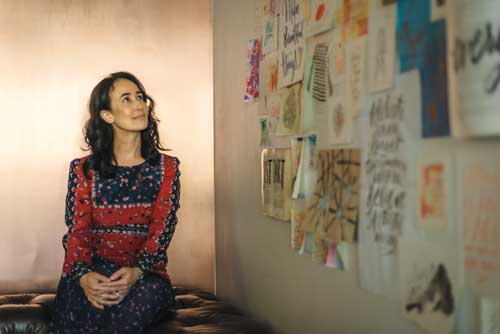When Mariam Naficy founded Minted.com, the online stationery retailer, in 2007, she “felt a little chicken” about testing her new business model. She was already a successful businesswoman. She’d received an MBA from Stanford and sold her first startup, the online cosmetics company Eve.com, for more than $100 million in cash. But she loved the idea she had for Minted: holding design competitions and letting customers decide which cards should be printed.
“I thought crowdsourcing would be a way to tap into undiscovered artists who were hidden from the normal system and deserved a chance at distribution,” Naficy says. “It seemed like a way to bring constant freshness to the equation.”
But she wasn’t sure anyone would go for it. A few T-shirt companies had tried it, with limited success. When she launched Minted in April 2008, she decided to sell stationery from namebrand retailers, too, just to be safe. In the first four weeks, the company made just one sale.
Business brightened a bit when Minted held its first design competition — and received 60 submissions. One to two orders per week started rolling in for the 22 winning designs and demand snowballed over time. In trusting her original instincts, Naficy, with Minted, had tapped into the zeitgeist. “I thought it was just my friends and I who wanted unique design,” she says. “But social media was starting to barge in and people were interested in expressing themselves in unique ways.”

Minted found its audience, changing the way many Americans create their holiday cards, wedding invitations and baby announcements, while also creating an entirely new market for designers and creative people around the world. In the process, the company became wildly successful. Minted, headquartered in a stylish former bank in San Francisco’s Jackson Square, grew from 15 to 400 employees. It now generates millions of dollars in sales each year.
The success stems in no small part from Naficy’s unusual skill set. A highly focused entrepreneur, she has both an astute sense for business and a keen eye for design. “It’s super rare to find people who have both,” says Hiroki Asai, a Minted board member and former vice president of global marketing communications for Apple, where he reported directly to Steve Jobs.
Naficy, an overachiever, has been honing these skills her entire life. As a child, she skipped two grades in school, graduating from high school at 16. She attended Williams College, got a job as a banker at Goldman Sachs, and then attended Stanford business school. While at Stanford, she published a book, The Fast Track: The Insider’s Guide to Winning Jobs in Management Consulting, Investment Banking, & Securities Trading.
Naficy grew up in the U.S., Africa and the Middle East as the daughter of a Chinese-born mother and an Iranian-born father, a United Nations economist. From these mobile origins she developed that restless, traveling spirit common to serial entrepreneurs. She also grew enamored of textiles and design. “I was always shopping in bazaars with my mom, haggling and trying to find some gem or treasure in a dusty corner of the market,” she says. “I grew up constantly looking at these objects.”
Though Naficy is not an artist, she comes from a family of them. Her grandfather, an antiques dealer in Shanghai, insisted that all his children receive an arts education. Her mother draws. Her uncle is a graphic designer. And her aunt, May Sun, is a well-known Los Angeles installation artist.
“I have this really strong appreciation for what it’s like to be a creative person,” she says, “and the incredible courage it takes to put a bit of your true soul out on display for everybody to see.”

She also knows how tough it is to earn a living as an artist — and is thrilled Minted has made it easier for people. “It’s almost like we found our revenue before we found our religion,” she says — holding design competitions long before anyone realized these were creating a way for artists to find community, support and a viable livelihood.
Traditionally, card companies have hired in-house designers and illustrators or subcontracted with a handful of people to create their cards. Designers outside major metropolitan areas rarely got a shot. With Minted, anyone can enter the multiple competitions the company runs at any given time and receive critiques from other artists, as well as votes from customers and fellow artists.
“Mariam saw an opportunity to open up the stationery space and allow more voices to be heard and more designers to have their work distributed,” says Jeremy Stoppelman, CEO of Yelp. “She created a democratic platform where anyone can participate in competitions, gain valuable distribution and build their resume. It’s a really powerful thing to have an open marketplace and ideas.”
“Minties,” as these artists are called, have also formed a large and vibrant community, connecting with and supporting each other through Facebook groups and in-person Meetups around the country. “We have 15,000 active participants,” Naficy says, “and they’re in all 50 states and in 60 countries.” Minties range from full-time artists to lawyers, plumbers and stay-at-home moms who moonlight as designers. And they’re in places such as Tulsa, Oklahoma; the Mormon communities of Utah; and the American Southeast, where “stationery is beloved,” Naficy says.
In 2012, Minted expanded into wall art, and it recently began offering pillows, lampshades, curtains, and a line of children’s furniture. This move has opened even more doors for Minties. “When we realized that we had not created a stationery business but this community, that’s when we sought out more venture capital and expanded,” Naficy says. “We were empowering a lot of people to find themselves creatively and get validation and move their careers in a completely different direction.”

Naficy’s steady, calm, forthright manner might suggest the road to success has been easy. It hasn’t. She’s raised $90 million from venture capitalists and battled inequities faced by many female entrepreneurs. “Trying to convince male venture capitalists to fund a business that primarily appeals to women can be a real challenge,” she says. “Invariably, the V.C. calls his executive assistant in and asks her, ‘Have you ever heard of this company?’ Seriously, it happens every time.”
Success has brought a tightly booked schedule. Naficy makes it a priority to spend time with her husband and two children, the second of whom was born the same year as Minted. She runs half-marathons with Every Mother Counts, Christy Turlington Burns’ nonprofit, and sits on its board. She’s also on the board of Yelp and the Stanford business school’s Advisory Council. “It’s a very regimented and scheduled life,” she says, “and there’s a part of me that’s very entrepreneurial and just wants to not have all the rules. I’d like a day when there’s nothing on my calendar.”
That may be a tall order — and probably one she may not truly want. “She’s a very hardworking, determined entrepreneur, and she cares a lot about the community she’s created,” Yelp’s Stoppelman says. “That’s probably one of the main reasons she gets up every day and hops, skips and jumps into work — so she can provide an outlet for all these incredible designers around the country and the world.”
This article originally appeared in Spaces Magazine.

